
New cyclists
Gear
Team GB’s success at the Rio Olympics has boosted interest in a wide range of sports and activities, especially cycling.
Although the British team wasn’t as successful in the Rio 2016 road events as they were on the track, most of us don’t have a nearby velodrome to practice our keirin technique. Road cycling, therefore, is likely to see the same boom in new participants as followed the London 2012 games.
This article looks at what both new and experienced cyclists can do to improve their road safety skills, protecting themselves and other road users.
Practice
It's not always "like riding a bike". If you have not ridden in some time, practice in a safe, traffic-free environment.
Make sure you familiarise yourself with the parts of the Highway Code applicable to cyclists, and with your local roads and cycle routes.
Several charities and organisations offer training programmes for new and "lapsed" riders, including Cycling UK and the Government-backed Bikeability.
Health issues
If you have any health concerns or existing conditions, check with a GP before you start cycling.
Experienced cyclists
While many riders who have been biking for years would benefit from a Highway Code refresher, even very experience cyclists are injured on Britain's roads every year, through no fault of their own.
According to the Royal Society for the Prevention of Accidents (RoSPA), 3,500 cyclists were killed or seriously injured in 2014.
RideLondon 2016
Events like RideLondon are popular with both new and seasoned riders. The event led to two cyclists being seriously injured. The first collided with a tree, and the second rider sustained a severe head injury after falling from his bike.
Roads were closed along the route, but the incidents resulted in a major alteration to the route. The redirection missed out the Box Hill section of the route, popularised after the road cycling event at the London 2012 Olympics.
Events like RideLondon demonstrate that riders need to do everything they can to reduce the risk of injury both to themselves and to others. You may not be able to control everything on the road, but you can ride (and encourage others to ride) as safely as possible.
Further training
Cycling UK also offer a range of courses and training, including Advanced Maintenance and Tour Leader courses aimed at helping experienced riders to hone their skills, develop their ability to help and train others, and to make Britain's roads safer.

 Written by Chris Salmon on 19th August 2016
Written by Chris Salmon on 19th August 2016
